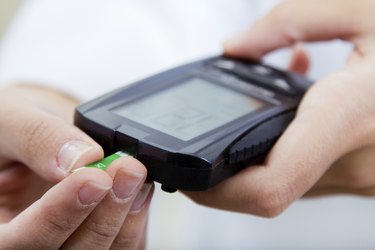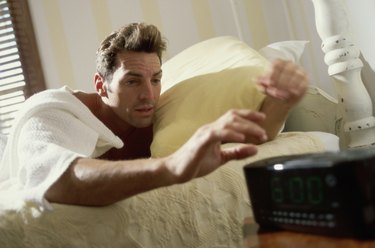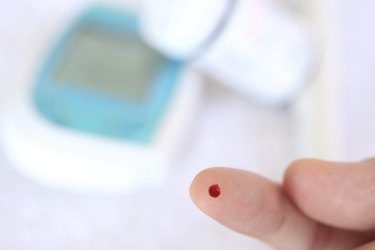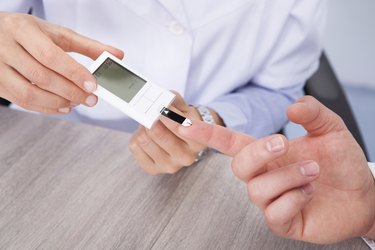
You may be puzzled by a high blood glucose reading in the morning despite going to bed with a good reading the night before. Or your postmeal blood glucose may be lower than the reading before you ate. Unusual blood glucose fluctuation can be frustrating for diabetics and is affected by many factors. Keeping a good record of your diet, medication and blood glucose can often help you solve the mystery.
Causes of High Glucose
Video of the Day

If you consistently wake up with higher blood glucose levels despite being compliant with your meal plan, this could be a condition known as the dawn phenomenon, states the American Diabetes Association. Dawn phenomenon is a a sudden rise of blood glucose levels 10 to 20 milligrams per deciliter in the early morning between 2:00 and 8:00 a.m. It is caused by an increased release of hormones such as cortisol, glucagon and epinephrine while your body is preparing to wake up. These hormones increase insulin resistance and stimulate your liver to release glucose, causing blood glucose levels to rise. Insufficient insulin or medication, excessive carbohydrate snacks at bedtime or high-fat meals at dinner may also cause blood glucose to be elevated in the morning.
Video of the Day
Strategies

To rule out if your high blood glucose is due to dawn phenomenon, your endocrinologist may ask you to eat a low-fat, carbohydrate-controlled dinner, maintain your usual physical activities and check your blood glucose around 2 or 3 a.m. for several days. Your doctor will help you determine if you have dawn phenomenon and adjust your medications accordingly. If the fluctuation is due to food, your dietitian may alter your meal plan and may suggest that you skip a bedtime snack or change the type of snack to a lean protein, modify your dinner or add some light exercise after dinner.
Causes of Low Glucose

When you wake up with higher blood glucose, chances are you will eat less carbohydrate at breakfast or increase your medication to lower your blood glucose. Be very careful when doing so, because your body is usually more insulin-sensitive after you wake up and are more physically active. You may end up with hypoglycemia. For lower postmeal blood glucose at other meals, note if you have increased your activities, because exercise makes your medications much more effective in lowering blood glucose. Some people have a condition called reactive hypoglycemia, where low blood glucose occurs after a meal. These people will benefit from meeting with a dietitian to develop a meal plan that regulates the timing of glucose release and insulin secretion.
Summary

Blood glucose fluctuation in diabetics is very common, and you can usually solve the problem by checking your blood glucose more frequently and paying attention to your lifestyle and medications. Because so many factors are involved when trying to explain an unusual pattern, get a diabetes educator to train you in reading your blood glucose pattern, and check with your doctor before making any big adjustments.
Is this an emergency? If you are experiencing serious medical symptoms, please see the National Library of Medicine’s list of signs you need emergency medical attention or call 911.